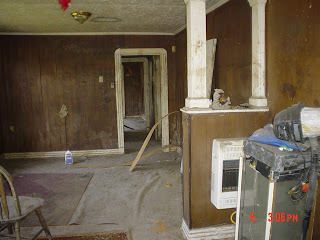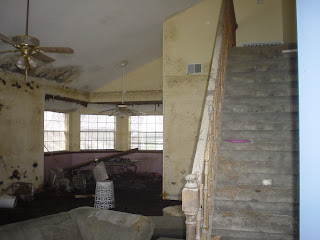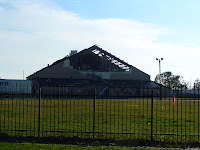14 Observations and Lessons Learned from
Post Katrina Home Marketing
 |
Gentilly neighborhood after Hurricane Katrina
(Photo by Wayne D. Lewis, Sr) |
It has been nearly 8 years as of this posting since
Hurricane Katrina.
Hurricane Katrina’s devastating impact, controversial
as to whether she caused the flooding in
New Orleans,
will still be identified as a procuring cause for the flood that impacted at
least 75% of
New Orleans.
Hopefully, and I mean this with all my heart, I hope that no
one will ever have to go through what we went through from Hurricane
Katrina. But my wish, as we all know, is
already too late. Our neighbors in St.
John the Baptist Parish
(Issac, 2012)
, our
neighbors in Terrebonne Parish (Gustav, 2008 )
as
well as our neighbors of the northeast coast, particularly New Jersey
and New York
, have
already been the victims of storm surge in the form of Sandy (2012)
that took their homes, destroyed the Boardwalk, destroyed lives, and not to
forget a host of other communities that have been affected by various disasters
along the eastern and southern coasts of the United States.
When I see these types of destructive forces, I get
flashbacks from the loss of our home in Gentilly Woods that sustained 3 ½ feet
of water, but 8 feet of mold post Katrina.
I also feel a sense of forlornness for others of our family members who
suffered great loss due to flooding throughout the New Orleans area. As a Realtor®, I also shared great empathy
with many of our clients, many of whom were unable to rebuild due to a lack of
or inadequate insurance, or too much governmental interference, preventing them
from getting back into their homes.
Many of my clients decided to sell their homes. However, not all of them sold their homes in
the same stage of “undress”, if you will.
Some of the properties that were damaged were sold as it-literally-as
is. Some of the homes looked as though
the water had just gone down after 4 months.
Wherever the water receded, that was where furniture and other personal
items were left, broken, and strewn about their homes. Other homes were gutted
to varying degrees. Some were gutted to
where the water stopped; some were gutted of the sheet rock, but they left some
items that did not get damaged by the water, but may have had some emotional
value down the road.
The bottom line is that the sale of the properties damaged
by the storm revealed some important issues that I could not have advise on
from prior experience. I could not
advise my clients whose homes were equally, if not more so, damaged as mine,
without sharing with my clients what I too had been going through. I had never sold storm-damaged properties, or
flooded properties, or properties with water in the gas lines, or properties that
were questionably sturdy, and could have fallen on top of me. But for those who decided to sell their
homes, it was still my responsibility to make sure that they got the best
dollar for their homes. What did I have
to work with? What would I have to work
with if, and that’s a big IF, I ever had to sell disaster-impacted properties
again? The question before me then was,
how did I prepare anyone to sell their damaged home? It’s something that we were never trained to
do. All of a sudden, we were rookies,
out of our element.
Here are some of the lessons learned, in no set order:
1.
SAFETY-Disaster
impacted homes, if they are still standing, are not all equal. Depending on their condition before the
disaster, the structure of any home is maybe subject to its pre-disaster
condition. If the property was subject
to roof leaks, or was in disrepair prior to the storm, then the storm just
added to the problem. If it was unstable
structurally, then it strongly advised that before entering a property, that the
owners obtain a structural engineer report.
 |
Gentilly Home after Hurricane Katrina
(Photo by Wayne D. Lewis, Sr.) |
2. Contractors- (Local or Out of Town
Contractors)-Almost instantly, contractors come out of the woodwork after a bad
storm or weather event. Many, but not
all, are from out of town. As homeowners
are trying to get their lives back together, contractors make promises to do
whatever is necessary, pending the homeowner turn over a nice sum of money, in
advance. It is advisable that unless a
homeowner has a personal contractor at the ready, they will need to access two
sources for possible reliable contractors to work on their homes:
a.
The Better Business Bureau
- should
already be on speed dial. After Katrina,
a lot of Contractors got a bad rap because of other contractors. Even if you haven’t decided to sell your
home, it would help you, as a homeowner, to avoid signing up the first person
who presents themselves as a contractor.
Reason: If the contractor doesn’t
pay their bills to their vendors, that may leave lien on your home when you do
decide to sell it.
b.
Contractors Association
-
The Louisiana State Licensing Board of Contractors provides up-to-date
information on those contractors who are properly insured and certified to
provide proper service to customers.
3. Insurance Claims- (Flood Claims, Homeowners
coverage, Wind Damage)- If the homeowner has his/her policies, it would be
incumbent on them to contact their agent/agency as quickly as possible. Their agent will have special instructions to
follow that may include taking pictures, meeting with a claims adjuster, or
insuring that the property is protected from any further damage (cover the
roof, or secure the house itself against
further damage, theft, or vandalism. It
is important for the homeowner to place their claim number in a safe place.
4.
FEMA-Federal Emergency Management Agency
-FEMA
has many obligations prior to, during and after a major disaster. After Hurricane Katrina they coordinated the
placement of 1000’s of mobile trailers that were (un)affectionately called FEMA
trailers.
They
provided an initial stipend to residents who had lost their homes either due
wind damage or flooding. They also
provided tarps to help keep homes from further damage from rain and roof leaks.
 |
Pine Village homes after Hurricane Katrina
(Photo by Wayne D. Lewis, Sr.) |
5.
American Red Cross -
The American Red Cross provided needed meals, clothing and first aid care. They also provided vouchers for those who
needed a place to stay (including hotels and rental properties). This maybe a good time to mention that all
attention should be paid to being safe.
Do not go into areas that have not been declared safe. Electrical wires could still be hot, water on
roads maybe covering up open manholes, or washed out roads altogether. BE SAFE!
6. What
to consider to do with your disaster-impacted home? Here are some options:
a.
Gut the home out and leave it as is, pending insurance
resolution;
b.
Gut it out and repair with Insurance proceeds;
c.
Leave as is (damaged) and sell it to the highest bidder
i. be aware of the need to maintain your damaged home by
boarding up and cutting the grass; Avoid city code violations;
ii. if there is a pool, be sure to drain and/or cover it to
avoid injuries and mosquitoes;
d.
Renovate and keep it
7.
The Decision
to Sell-
 |
Gentilly Home flooded after Hurricane Katrina
(Photo by Wayne D. Lewis, Sr.) |
The above options can’t necessarily
be made in a vacuum. Given whatever set
of circumstances the homeowner is facing, the decision to keep or sell their home
needs to be made based on costs. This in
no way suggests disregard to the feedback of family, but the homeowner’s name
is in play. The cost factor could
include the cost to rebuild and maintain a home that is likely to be impacted
again in the future by a similar set of circumstances as occurred as a result of
Katrina. One of the subsequent costs to
be evaluated too, is increased insurance coverage.
- What should the homeowner be aware of if
they decide to sell their disaster –impacted home?
- Any
outstanding taxes-At what point can the taxes be reduced on the home
since the damage on the home;
- Insurance
should be changed from homeowners to a lower risk policy, possibly a
builder’s risk policy
(consult your insurance provider). This policy may be sufficient if the
house is damaged and is not inhabitable;
- How much do I sell my disaster-impacted
home for? Or, how much is my
disaster impacted home worth?
The decision to sell your home
after a disaster will be hard enough, but then to come to the realization that
it maybe worth far less than it was only days or months ago, will be another
challenge for the human spirit. This is
where a licensed Realtor will need to come into play. It is still recommended that you interview
agents to see what perspective and experience they may have with such devastation. It should not be a determining factor that an
agent has or is suffering from the same disaster in order to prove qualified to
sell your home. Experience however, is
still extremely important.
 |
Home flooded to 2nd floor in Violet, LA after Hurricane Katrina
(Photo by Wayne D. Lewis, Sr) |
- Whomever
you choose will as your agent, they will now need to gather comps. Suffice it to say, that if your home
suffered any level of loss close to or equal to the flooding in New Orleans post
Katrina, there maybe a shortage of reasonable comps. The one problem that became an issue during
the aftermath was, what was selling, and how close to the seller’s home
that that those homes could be used as a comparable home? Who else was pricing their homes? What made sense? What we learned was that despite the
fact that a home was damaged, it still had functionality as long as it had
4 walls, and a replaceable roof, not to mention a sturdy foundation. So it wasn’t a matter of a structure on
a lot, where in some cases properties may have sold for lot value, there
were other factors that had to be taken into account as well.
- Location
Even after Hurricane Katrina, where
1000’s of homes flooded, all over the city, location,
location, location was still apparent.
A home in Gentilly still could not be compared to a home that flooded in
Lakeview. Nor could a home along Chef
Menteur Hwy. and Read Blvd. be compared to a home
at Caffin Ave.
and Royal St.,
despite any physical similarities to the contrary. Despite apparent similarities, the water had
not changed the dynamics of the overall location of properties in New Orleans.
 |
Algiers Church after Hurricane Katrina
(Photo by Wayne D. Lewis, Sr) |
- Financing Challenges
Immediately after a major flooding
event, homes will be very difficult to finance.
Many banks and loan companies may not take a chance on homes that were
damaged on a large scale. So, unless a
home sells for cash, and it most likely will, then financing will be awhile
before it becomes the norm. Depending on
where you are in the decision to sell your home, and if no one else has sold
their home in your designated area, you may have to throw a price out
there. If it sells too fast, then you
know you may have priced it too low. If
your home sells after 6 or more months, then adjusting the price would be
strongly advised throughout the time period and going forward.
- Pricing, selling and insurance
If insurance has been collected on
the house, and your intent is still to sell (consult with your attorney, CPA,
or Insurance provider on how that works), the pricing will be a matter of a
small profit, all other things considered.
However, it may not matter whether you have collected insurance in the
pricing of the property. But buyers will
want to know if you received insurance on your damaged home. Buyers may want the money that you collected
from the insurance company for which they are looking to repair the home. You may have to negotiate the proceeds of the
sale including any insurance that your received, or any other grants that you,
as a seller, may have received since the damage to the home
Pricing is relevant here because you
may want to sell the house at a price that includes the cost of selling your
home in the condition that it is in, even if you received insurance for your
loss. Pricing is extremely important on
a disaster impacted home because it can backfire.
 |
East Lake Plaza after Hurricane Katrina
(Photo by Wayne D. Lewis, Sr) |
In order to avoid pricing backfire,
especially in the absence of viable comps, it maybe best to wait until other
homes are on the market in your area.
Putting your home on the market too early after a disaster may result in
a greater loss, that can’t be recovered once the property is sold. If you are among the sellers who rush to sell
their homes right after a disaster, you can expect to take a greater hit. Therefore, it is strongly suggested that you,
as a seller, wait 3 to 6 months before putting your home on the market. After that amount of time, you should have
several sales to use as a means of pricing your damaged home.
- Minimal Repairs
Earlier we talked about gutting a
home. This will be a very important
decision in the decision to sell the home.
A home that is gutted could be the difference of approximately
$10-20,000, depending on other factors.
Generally, for the cost of a good gut job, $1000-$2500
,
could earn an additional money on the home.
For example, be sure to get a tarp from FEMA to reduce, any further
damage to your home in the event of roof damage. Board up the home to prevent, as much as
possible, any vandalism. Cut the grass
and remove any post flooding debris in the yard. These are seemingly insignificant acts, but
they could make a difference when you, as a seller, decide to sell your home.
 |
Home in Gentilly flooded after Hurricane Katrina
(Photo by Wayne D. Lewis, Sr.) |
In conclusion-
As I said earlier, I hope that no one, from this point
forward, ever have to face what I, my family, and clients have had to witnessed
in terms of the disaster we have seen.
But we know the probability is very low of that never happening. But the best way to be prepared is to get the
appropriate insurances. With respect to
flooding, homeowners coverage, or Builder’s Risk, see your insurance
provider. If your home is damaged, be sure
to take reasonable precautions to protect your family and you from injury by
listening to all public broadcasts, by not venturing into areas not deemed to
be safe. If you decide to have your
repaired, be sure to check with the Better Business Bureau, or the Louisiana
State Licensing Board for Contractors. If
you decide to sell your home, you may want to wait until there are a sufficient
number of homes on the market, or that have sold in order to get the most that
you can for your home, but be sure to check with your Realtor. If you need to
locate a Realtor, contact the New Orleans Metropolitan Association of Realtors
,
or the Louisiana Real Estate Commission
for licensed real estate professionals. Just
be aware that the amount of insurance you may receive on your disaster-impacted
home maybe a point of contention when selling your home, so be prepared.
Finally, know that we have not covered every possible set of circumstances
here, and could never do so in this small a forum. As always, consult with your respective
professionals for a possible course of action to be considered, including but
not limited to your Realtor, your insurance provider, your CPA, your medical
professional, and/or your attorney, where necessary.
 |
9th Ward home after Hurricane Katrina
(Photo by Wayne D. Lewis, Sr) |
Disclaimer:
Information provided here while deemed be from reliable sources, is not
guaranteed. Information here is not
intended to solicit the business of any broker or agent.
Labels: American Red Cross, Builder's Risk, Contractors after disasters, Disaster-impacted homes, FEMA, National Association of Realtors, Structural Engineer's Report









